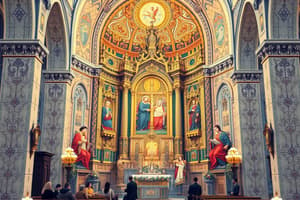Podcast
Questions and Answers
Why do we need faith?
Why do we need faith?
Faith combats fear and provides hope and guidance through belief in God, the teachings of Jesus, and the Church.
Which of the following are aspects of religion?
Which of the following are aspects of religion?
- Creed
- Code
- Cult
- All of the above (correct)
What are the three aspects of religion?
What are the three aspects of religion?
Creed, Code, Cult
What is the relationship between faith and human act?
What is the relationship between faith and human act?
What do creeds represent in faith?
What do creeds represent in faith?
Sacred Tradition is changeable and can grow in understanding.
Sacred Tradition is changeable and can grow in understanding.
How does the Catholic faith evolve?
How does the Catholic faith evolve?
Scripture alone is used for interpreting divine revelation.
Scripture alone is used for interpreting divine revelation.
What is the role of the Magisterium?
What is the role of the Magisterium?
What leads to true freedom according to faith?
What leads to true freedom according to faith?
What does faith produce aside from belief?
What does faith produce aside from belief?
What is necessary for salvation according to faith?
What is necessary for salvation according to faith?
According to Protestants, what alone saves?
According to Protestants, what alone saves?
Faith and reason can contradict each other.
Faith and reason can contradict each other.
Which elements support faith?
Which elements support faith?
What does faith lead us to seek?
What does faith lead us to seek?
Faith is based on feelings.
Faith is based on feelings.
What choice does 'losing your faith' refer to?
What choice does 'losing your faith' refer to?
What are common reasons for unbelief?
What are common reasons for unbelief?
What does faith teach us about happiness?
What does faith teach us about happiness?
Who is the ultimate answer to doubts and problems?
Who is the ultimate answer to doubts and problems?
Flashcards are hidden until you start studying
Study Notes
Faith and Its Role in Religion
-
Importance of Faith: Faith helps individuals combat fears related to death and conflict by providing hope and guidance through belief in God and the teachings of Jesus.
-
Religion as a Relationship: Religion connects believers with God, consisting of:
- Creed: Core beliefs reflected in the Apostles’ Creed.
- Code: Moral guidance from the Ten Commandments.
- Cult: Worship practices centered around the Mass and prayer.
-
Act of Faith: Faith involves a personal and divine response; it is an act of believing in God's revelations.
-
Creeds: Serve as summaries of core beliefs about God, aiding in articulating faith but not defining God's essence.
-
Sacred Tradition: Encompasses teachings handed down from Jesus, recognized as divine and unchangeable, while still growing in understanding.
-
Faith and Progress: The Catholic faith evolves while maintaining core truths, with doctrinal development ensuring teachings remain relevant.
-
Connection of Faith and Scripture: Both Scripture and Tradition are vital, with interpretations focused on Christ and informed by the Church’s living tradition.
-
Role of Church Authority: The Magisterium clarifies essential dogmas but does not create them, recognizing mysteries of faith vital for salvation.
-
Faith and Freedom: Faith must be a free choice, leading to true freedom and personal conviction.
-
Faith Beyond Feelings: Although faith produces positive emotions, it is fundamentally a choice to trust in God's truths, independent of feelings.
Faith and Belief
-
Difference Between Belief and Faith: Belief is an intellectual acceptance, while faith involves a relational trust in God.
-
Worth of Faith: Faith is worth dying for, as it leads to salvation and good works; genuine faith in God extends beyond Catholicism.
-
Gift from God: Faith is a gift accessed through the Church and the Holy Spirit, with individuals having the freedom to accept or reject it.
The Effect of Faith
-
Spiritual Life: Faith initiates spiritual rebirth, allowing individuals to become children of God.
-
Role in Salvation: Faith is essential for salvation, facilitating divine connection and entry into the soul.
-
Growth and Expression of Faith: Growth in faith leads to good works as its natural expression, demonstrating visible faith through obedience.
Faith and Works
-
Catholic View on Faith and Works: Catholics believe faith must produce good works, counter to the Protestant view of salvation by faith alone.
-
Definitions of Faith and Salvation: The concepts have both broad and narrow meanings in Scripture, emphasizing that salvation comes through Christ, not just actions.
Faith and Reason
- Compatibility of Faith and Reason: Faith and reason coexist without contradiction; both lead to the truth and are supported by evidence such as miracles and saints' lives.
Faith as Certainty Yet Mystery
- Nature of Faith: Faith is certain yet includes mysterious aspects related to God, encouraging a pursuit of deeper understanding.
Faith and Beauty
- Creative Influence of Faith: Faith has inspired significant artistic expressions reflecting divine beauty, as seen in the lives of saints.
Faith and Trials
- Role of Suffering: Suffering is seen as a means to strengthen faith, fostering belief in an invisible God.
Challenges to Faith
-
Maintaining Faith: Faith is a deliberate choice and isn't easily lost; common barriers include misunderstanding, indifference, and pride.
-
Addressing Doubts and Evil: Trust in God’s ultimate control over evil and pursue understanding through teachings and divine guidance.
Faith and Christ
- Centrality of Christ: Jesus is presented as the ultimate answer to doubts and life’s problems, with the crucifix symbolizing His sacrifice and victory.
Studying That Suits You
Use AI to generate personalized quizzes and flashcards to suit your learning preferences.




